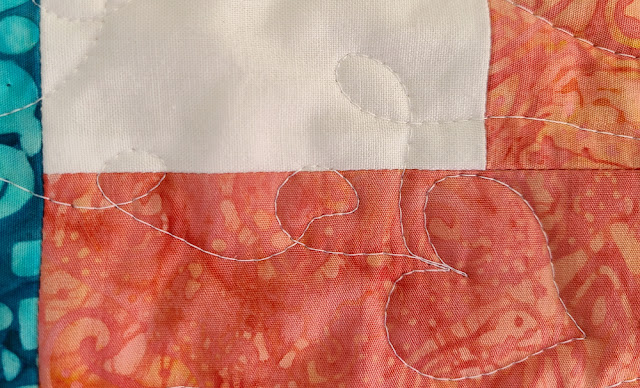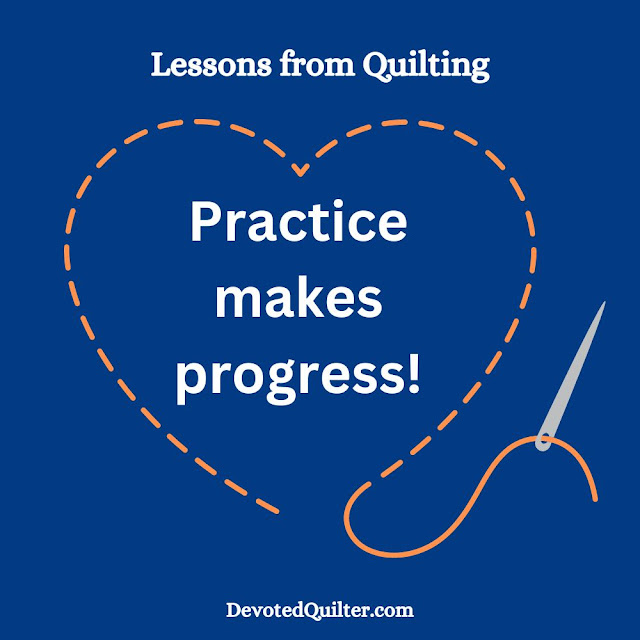Welcome to another Lessons From Quilting post! We learn so much as we pursue this obsession with quilting, and many of those lessons apply to life away from the sewing machine, too. Let's explore this month's lesson 😊
We've all heard the phrase 'practice makes perfect.' We've probably all said it at some point, too. Over the years, though, I've decided I disagree! Practice makes us better at whatever skill we're practicing, but it doesn't make us perfect at it.My free motion quilting is the perfect example of this. I've been doing fmq since 2010, which means I've had over a decade of practice. My quilting skills are waaaaaay better than when I started, but there are still plenty of wobbles, weirdly shaped flowers or hearts, and places where my travel stitching travels right off the line I'm supposed to be following. Sometimes I get lost on my stitching path and go in completely the wrong direction. And yes, sometimes I have to rip out my quilting, though I try to embrace the wobbles whenever I can.
Case in point: here's a close-up of the quilting I did last night on Berry Pi. We have two smooth loops and one where I wobbled and made one that looks more like a kidney bean. Not a big deal, and I certainly didn't bother ripping it out, but it's not perfect, either.
'Practice makes progress' fits any creative endeavor; learning to play an instrument, drawing, wood carving, photography, knitting...All these skills get better with practice, but I've never met a person who thought they were perfect at whichever of them they practiced.
What about outside the creative life? Does 'practice makes progress' work with non-creative skills? Yes! All you have to do is watch any major sports competition and you'll see incredible skill, the result of hours and hours of practice, but you won't see anyone who makes every single shot or never makes a misstep.
That might seem disheartening (with all that work, even with years of practice, perfect is still out of reach?), but I think it's empowering. Pursuing perfect leaves us dissatisfied with the progress we've made, no matter how far our skills have come, because we inevitably see the gap between our results and perfection. Pursuing progress, on the other hand, helps us see the gap between where we started and where we are now, and seeing that improvement feels good!
When we change our goal from perfect to progress, a funny thing happens to practice - suddenly it feels motivating rather than like a never-ending chore. Chasing perfect can leave us feeling frustrated after every practice session because we focus on the wobbles or the shots we missed, we beat ourselves up over the mistakes, and we dismiss any successes because they're not enough. But if our goal is to make progress, then every improvement in our skills is a win, and when we feel like we're winning, we want to keep practicing. It becomes a positive feedback loop - the more we practice, the more progress we make and the better we feel, so the more we want to practice, and on and on it goes.
Whether it's smoother lines in your free motion quilting, a higher success rate sinking 3 point shots, or drawing a realistic looking eye, where have you been making progress through practice lately? Celebrate those wins!




That's a really good point - the difference of a goal being perfection or progression.... Now, if only there was a way to prevent procrastination! ;-)
ReplyDeletePractice makes progress is a really healthy way to think about things. Besides, what really is perfection? If we want to hold up nature as a source of inspiration and perfection, many might be amazed at the real variety and number of wobbles that are abundant everywhere in nature. I love this, Leanne.
ReplyDelete